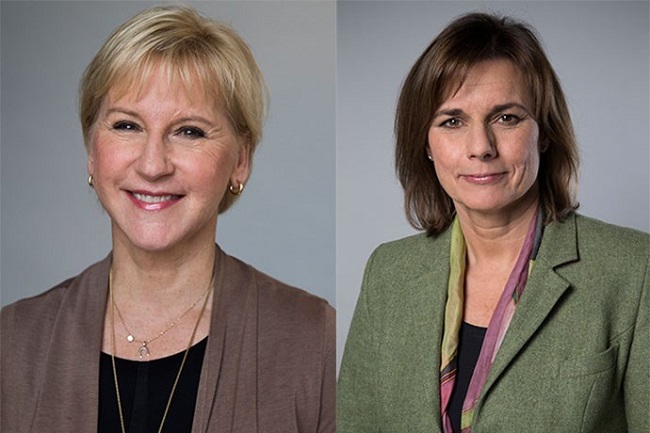Sweden gives more to Syrian aid effort

(From left) Margot Wallström, Minister for Foreign Affairs and Isabella Lövin, Minister for International Development Cooperation.
Photo: Kristian Pohl/ Regeringskansliet
The war in Syria will soon enter its fifth year. There are alarming reports about how winter is hitting the refugees in Syria, who do not have enough warm clothes and shoes, and images of emaciated people bear witness to how starvation is being used as a strategy of war. More than 400 000 people are starving in besieged cities. This is completely unacceptable, and the people responsible for crimes against humanity and war crimes must be held to account. Some 13.5 million people in Syria are in need of humanitarian aid or have been forced to flee from their homes. Sweden was a driving force in the adoption of the UN resolutions on increased humanitarian access, and we are now pushing for them to be respected. At the international donors conference that opens in London today, Sweden will pledge an additional SEK 350 million (about $41m) in emergency assistance to those affected by the war in Syria.
But humanitarian aid is not enough. Many people have given up hope of a decent future. This is equally true of those who have chosen or been forced to stay in Syria and those who have fled to neighbouring countries. They have very few possibilities to work, and far too many children are unable to attend school. This is a very troubling situation.
A political solution is necessary to bring an end to the conflict. It is therefore encouraging that the peace negotiations in Geneva were initiated, even though they are currently suspended and it will take time to achieve a solution to the conflict. The intensified Russian bombings and the world’s inability to make the Assad regime conform to the Security Council’s demands for an end to sieges and bombings of civilians, full humanitarian access to the civilian population, and the release of political prisoners have played a major role in jeopardising the now suspended peace talks.
The donors conference in London is crucial in mobilising support for all the people affected by the horrors of the war and to offer hope to underpin future peace. The UN Special Envoy for Syria Staffan de Mistura has our wholehearted support. To increase the prospects of success in the discussions in Geneva, we are also giving substantial support to increase women’s participation and influence in the negotiations.
The international community must try to inspire hope and support existing positive forces. We are therefore taking both a pledge to increase humanitarian aid and Sweden’s new Syria crisis strategy, encompassing initiatives totalling SEK 1.7 billion, with us to London. Sweden is the first country to adopt a long-term strategy for the Syria crisis, and it is a model that we believe more countries should emulate. The strategy aims to mitigate the effects of the conflict in both Syria and neighbouring countries. During the conference we will push for more countries to increase aid in five areas that are central to Sweden’s Syria strategy:
- People in Syria and neighbouring countries must have increased opportunities to support themselves. Being able to support oneself inspires hope, and reduces the risks of forced marriage, forced labour and recruitment to terrorist groups, thus having an impact on all of our safety. In neighbouring countries, it can reduce tensions between refugees and local people, and offer people dignity and faith in the future. It also maintains and builds on people’s skills, which is important for the future.
- More people must have access to community services in Syria and in neighbouring countries. This means more children attending school, and access to water, sanitation and health care for more people. More than three million children are not going to school, and the number is increasing. There is an impending risk of child labour and recruitment of child soldiers. If we do not take strong action, we risk creating a lost generation, which will hamper reconstruction.
- The courageous civil society organisations that remain in Syria, negotiating local truces, working for dialogue and documenting crimes against human rights, need more support. Sweden is currently one of the few donors to such organisations.
- Work to prevent violence against women and girls and ensure that victims of sexual violence receive rehabilitation and care must be given more resources.
- Women must be able to participate in peace processes on equal terms with men. Sweden gives concrete support to women’s participation in the Geneva negotiations and to women who are active in local peace efforts on the ground in Syria. More countries need to do more to ensure that half of Syria’s population is not excluded from the peace process.
We hope that the London conference will result in a considerable increase in support from the rest of the world to those affected in Syria. Nonetheless, aid will not end the war. That will require a political solution, and the defeat of the terrorist organisation Daesh. But used wisely, aid can lay the foundations for a future peace. It also offers a lifeline to many people, and it can inspire faith in the future and show that the international community has not forgotten them.
Minister for Foreign Affairs Margot Wallström
Minister for International Development Cooperation Isabella Lövin

